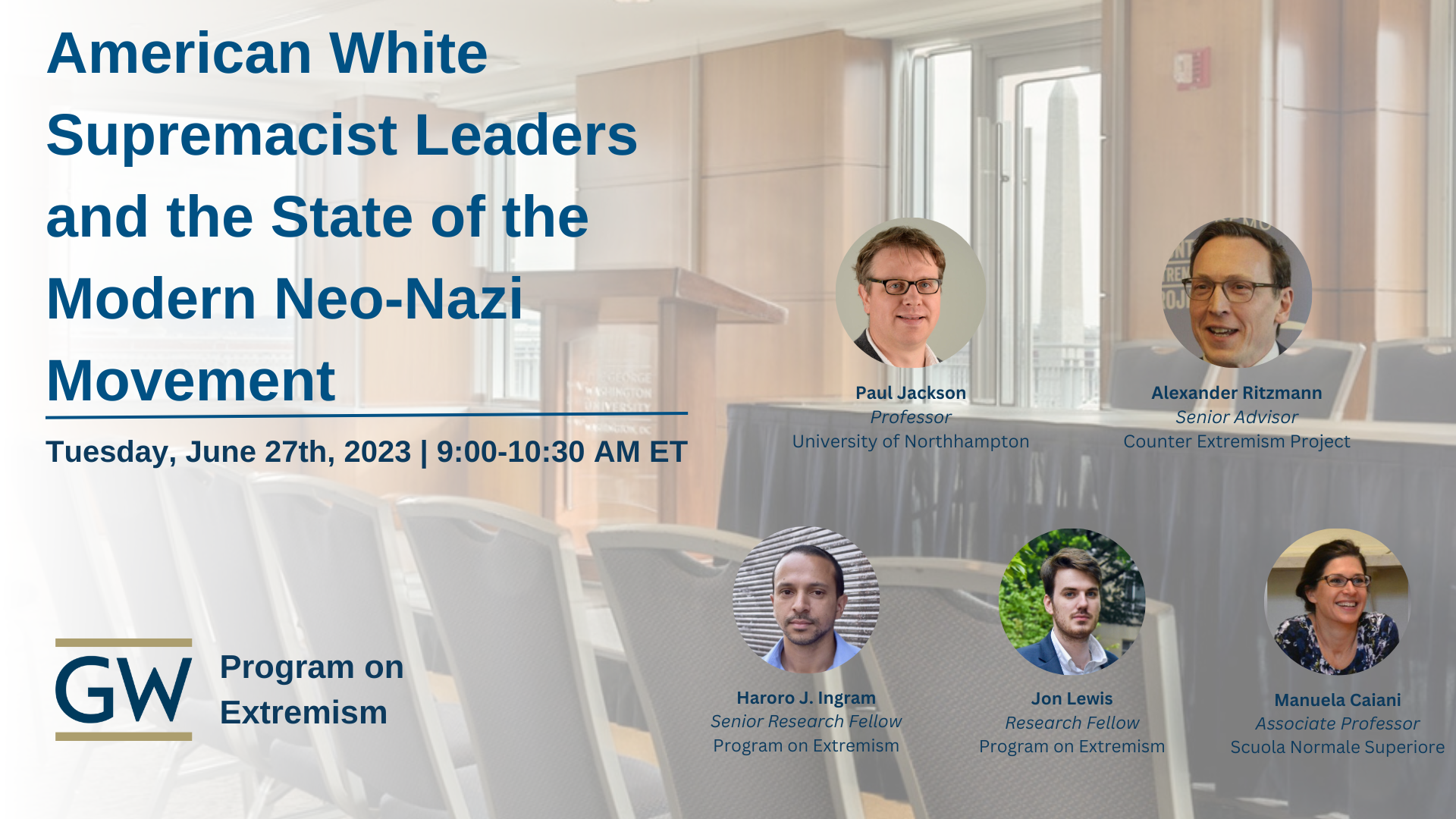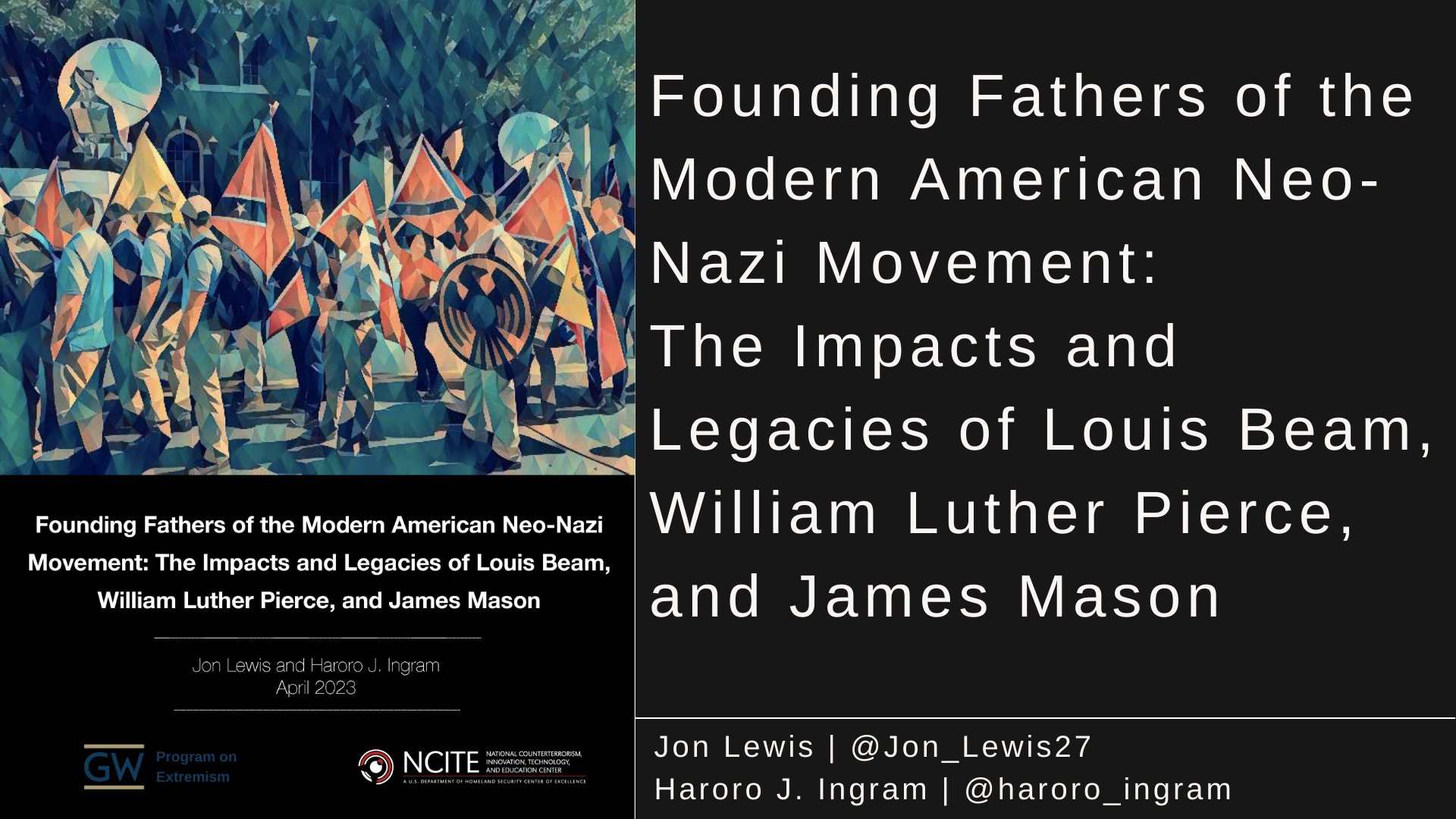American White Supremacist Leaders and the State of the Modern Neo-Nazi Movement

Summary
On June 27, 2023, The Program on Extremism at The George Washington University hosted a virtual event to accompany the launch of its latest report, Founding Fathers of the Modern American Neo-Nazi Movement: The Impacts and Legacies of Louis Beam, William Luther Pierce, and James Mason.
Recent years have witnessed the revitalization of transnational neo-fascist and white supremacist movements, which are largely online, decentralized, and typically leaderless. However, these modern manifestations are shaped by the ideologies and strategies of the prominent white supremacist leaders, and evidence a clear connection to the previous iterations of the movement. Panelists explored the findings of the report and situated them within the latest trends in the transnational neo-fascist milieu, exploring the evolution of these movements as well as the policy implications for the United States and Europe. This panel was moderated by Senior Research Fellow at the Program on Extremism Haroro J. Ingram and included insights from:
- Manuela Caiani, Associate Professor in Political Science at the Scuola Normale Superiore
- Jon Lewis, Research Fellow at the Program on Extremism
- Alexander Ritzmann, Senior Advisor at the Counter Extremism Project
Jon Lewis opened the panel by summarizing key findings from the latest report on the legacy and impact of three of the most influential leaders in the modern American far-right ecosystem. The report provides a detailed analysis of important events, drivers, and inflection points in the leadership trajectories of Beam, Pierce, and Mason. Importantly, it highlights the interconnectedness of Beam, Pierce, and Mason between the 1960s and the 1980s despite relatively limited direct contact between the men. While Lewis touched on the evolution of the three figures, he noted the most striking finding was the enduring impact of the three leaders. The modern neofascist accelerationist movement today is directly propelled by the legacy and works of Beam, Pierce, and Mason. It has fully embraced the race war concepts presented in Pierce’s Turner Diaries, the accelerationist nature of Mason’s Siege, and the idea of leaderless resistance popularized by Beam. Beam, Pierce, and Mason’s legacies continue to influence today’s white supremacist movements born on online spaces and driven by a desire to collapse the established social order.
Alexander Ritzmann followed with remarks on the use of combat sports as a new propaganda and recruitment strategy employed by the far-right. He focused specifically on two new leaders within this far-right combat sports network: Robert Rundo, an American citizen and the founder of the Rise Above Movement, and Dennis Kapustin, a Russian national and the leader of the Russian Volunteer Corps. Rundo’s mainstreaming strategy focuses on what Ritzmann dubs the “Californication” of combat sports. This strategy focuses on trying to make far-right combat sports approachable by presenting a “friendly face” by creating propaganda videos featuring conventionally attractive men. On the other hand, Kapustin has taken a militarization approach and provided his followers with access to weapons and battle experience as evidenced by his Russian Volunteer Corps currently fighting in Ukraine. To wrap up his discussion, Ritzmann noted that this is a transnational issue and that the mainstreaming strategy of combat sports has been exported to several countries including the Netherlands, France, Sweden, Finland, Croatia, Estonia, Latvia, Germany, Canada, the United Kingdom, and Ireland.
Manuela Caiana rounded out the panelists’ presentations by discussing the transnationalization of far-right activism. Her research considers far-right extremism through a social movement lens. She described the far-right as a network of groups and/or individuals connected by shared constructions of alternative political realities. To show the transnationalization of the far-right network, Caiana presented the results of a social network analysis project that analyzes far-right organizations and websites. Among many findings, one-third of the observed organizations contained transnational links demonstrating the diffusion of these constructed realities among far-right actors transnationally. This is also exemplified in the use of irony and humor among far-right actors from the United States. She concluded by emphasizing the importance of tracing organizational links to better understand the transnational nature of far-right networks.
To conclude the discussion, the panelists addressed the implications of the mainstreaming of white supremacy for practitioners. Lewis noted that white supremacist narratives previously relegated to fringe online spaces and Neo-Nazi groups have now been elevated to mainstream platforms. The diffusion of these ideas has increased the availability of white supremacist narratives and speaks to the complexity of addressing the far-right challenge. Ritzmann addressed this diffusion of white supremacist narratives using the great replacement theory echoed across US and European far-right spaces as an example. He said that the best course of counteraction is for governments to identify leaders and disrupt the dissemination of those leaders’ rhetoric. Fundamentally, extremists seek to provoke the government into overreaction, therefore, Ritzmann cautioned that counter-extremism strategies should be proportionate to the threat in order to avoid this trap and further fuel far-right rhetoric.


